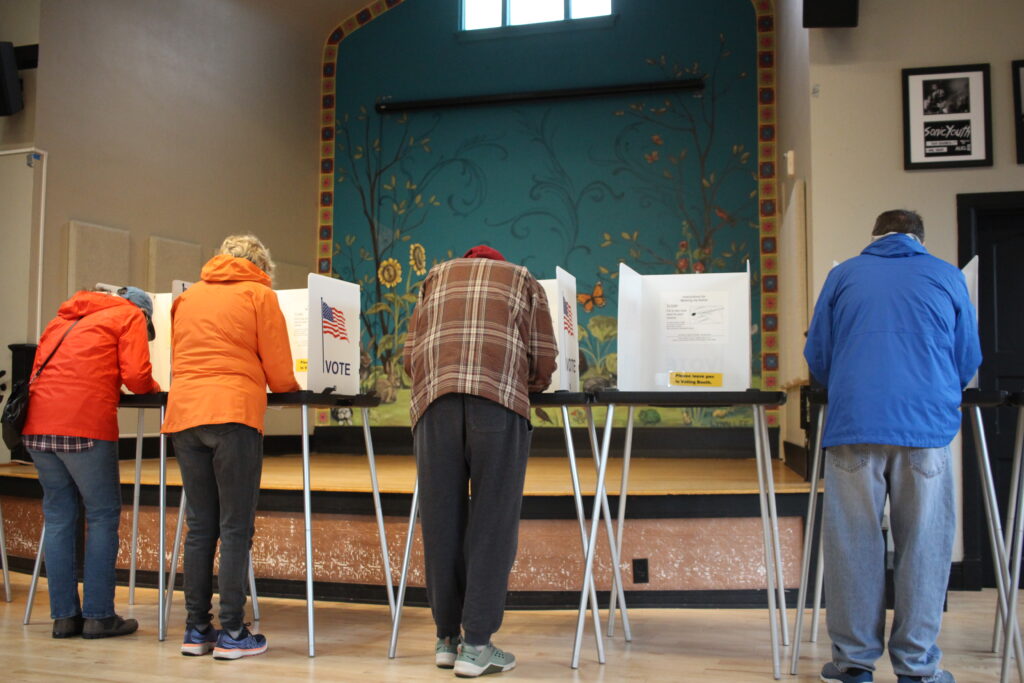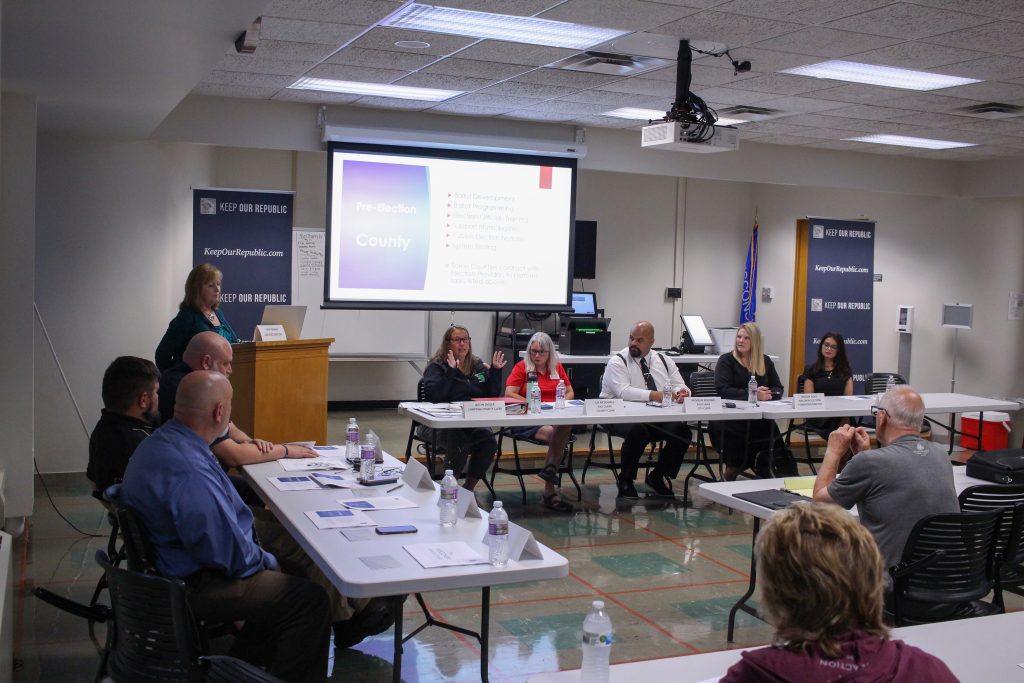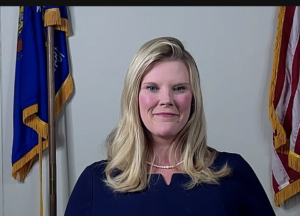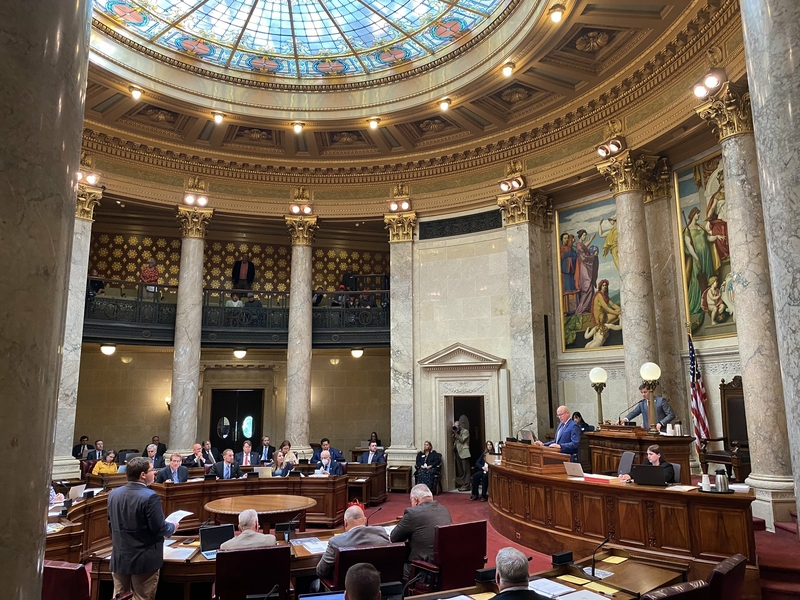WEC Leader Urges 2024 Candidates ‘Tell the Truth’ About Elections
Meagan Wolfe says false claims make it hard for Elections Commission to do its job.

Voters at the Wilmar Neighborhood Center on Madison’s East side cast their ballots. (Henry Redman | Wisconsin Examiner)
For years, Wisconsin Elections Commission (WEC) Administrator Meagan Wolfe has insisted that the best way to combat the election conspiracy theories that have taken hold among a subset of the state’s lawmakers and electorate is to repeatedly provide voters with accurate information about how elections are run.
The commission has worked to provide that accurate information in large ways through mass media such as radio and television and in small ways, community by community. Wolfe herself has attended community forums to speak directly to skeptical voters. This year, with the source of those conspiracies — former President Donald Trump — likely on the ballot again, that work will be put to the test.
Wolfe says that the only way to combat misinformation about Wisconsin’s election system as November 5 approaches is to continue providing accurate information about how it works.
“I really believe that the more well-informed that people can be, the less likely it will be that they’ll fall victim to bad information about elections,” she tells the Wisconsin Examiner.

Meagan Wolfe (second from right) watches as Chippewa County Clerk Jaclyn Sadler explains how a county prepares for an election at Kathy Bernier and Keep Our Republic’s Chippewa Falls event on July 31. (Henry Redman | Wisconsin Examiner)
In 2020, Trump refused to accept defeat, using social media, cable news and a loyal base of supporters to stir up widespread discontent that ultimately led to the Jan. 6, 2021, attack on the U.S. Capitol. Conspiracies about late night ballot dumps in largely Democratic voting cities like Milwaukee abounded. Ten Wisconsin Republicans, with the help of Trump-aligned attorneys and U.S. Senator Ron Johnson, cast Electoral College votes for Trump and attempted to have them used to overturn the results of the election, which Joe Biden won by 21,000 votes in Wisconsin. A member of the commission itself joined that effort and appeared at rallies with some of the most extreme believers in the conspiracy theories.
That election took place as the country was reeling from the COVID-19 pandemic and widespread protests against police brutality. The mobilization of Republican voters against the voting system itself sprung up quickly and often haphazardly.
But since then, many of those voters have organized, with a dedicated group that has continued to claim the election was nefariously stolen from Trump. This group turns out at public hearings in the state Legislature’s elections committees en masse in attempts to push the state Legislature to limit absentee voting. The members of these groups make disproven claims about the voter registration system and call for the removal — and even the arrest — of lawmakers they see as disloyal to their cause or election officials they view as corrupt.
That organization has led a group of Republicans to launch a recall effort against Assembly Speaker Robin Vos (R-Rochester) — who himself is responsible for the widely derided review of the 2020 election conducted by former state Supreme Court Justice Michael Gableman. Just last week, Republican infighting spilled onto the Assembly floor as a faction of lawmakers attempted to force a resolution onto the floor to impeach Wolfe.
Wolfe says it’s frustrating to repeatedly fact-check the same claims made by the same groups for the last four years.
“It is really challenging, because many of the false claims about elections that are still being made by some of those groups are the exact same claims that were being made, you know, three, four years ago, and that have been disproven in court, they’ve been disproven by audits, they’ve been disproven by recounts of the election,” she says. “And it seems like some of these groups have, frankly, turned it into a business. And they find that there’s certain false claims about elections that must be profitable for them, that they continue to make over and over again, even after they’ve been thoroughly debunked.”

Wisconsin Elections Commission Administrator Meagan Wolfe speaks at a virtual press conference after the state Senate voted to fire her on Sept. 14. (Screenshot)
The effect, she says, is to confuse the electorate. Many voters don’t follow the ins and outs of every claim or pay attention to each twist and turn of every lawsuit and committee hearing on the issue, yet can be swayed by a sensational conspiracy theory. That can be hard to combat because election administration is actually quite dull.
Of the personal attacks against her, which include the impeachment resolution in the Assembly and the attempt by the Senate (which was recently declared illegal by a Dane County judge) to remove her from office, Wolfe says that’s all politics and politics isn’t her job.
“I am the nonpartisan chief election official for the state of Wisconsin, and I take that very seriously,” she says. “And I view a lot of what is happening as politics. And frankly, politics is not my business, and it wouldn’t be appropriate for me to weigh in on that. What my job is, is to focus on administering elections. So, focus on supporting Wisconsin’s 1,850 local election jurisdictions, our 72 counties, and our over 4 million eligible voters and making sure that they have what they need to interact with the election process here in the state of Wisconsin.”
Those things, she says, she views “as something that is a distraction, and could be a distraction if I let it, but I choose to focus on the work at hand because it’s important, and I need to dedicate all my attention to ensuring that we’re able to run fair, accurate, secure elections in 2024.”
Despite the noise that has often come out of the Legislature on the state’s election systems, a number of proposals to change the election system have gained bipartisan support. Some of those changes directly address complaints the conspiracy theorists have raised — though they’ve then complained about the proposed solutions. Aside from the possible legislation, court decisions from across the state have also changed the state’s election laws since 2020, making regular complaints about issues such as the use of absentee ballot drop boxes irrelevant this year.
Wolfe says her job isn’t to weigh in on potential changes to election law. Nevertheless, she cautions, if the Legislature and Democratic Gov. Tony Evers are going to enact the proposals into law, they need to be mindful of what it takes to implement those changes and educate voters about what they mean.
“We’re now solidly in the election cycle, so we have the February election, the April election, the August election, and the November election,” she says. “And from here on out, there’s barely a single day where there’s not some type of election-related deadline. And so the closer we get to the elections, the more difficult it can be for us to implement major changes just because of all the moving parts involved.”
Ultimately, Wolfe says that if the 2024 elections are going to go smoothly, people in positions of authority need to be truthful.

In September, the GOP-controlled Wisconsin state senate voted to oust Meagan Wolfe as the head of the Wisconsin Elections Commission. Wolfe was the target of false conspiracy theories about illegal voting during the 2020 election, but she has refused to step down. (Henry Redman | Wisconsin Examiner)
“It’s just really important that people in positions of power, candidates, tell the truth about elections, get engaged, see how elections actually work,” she says. “And I think the more people we have that are willing to tell the truth about elections and about how elections work and to engage in the process, I think that will set us up for a successful election and to ensuring that people have confidence in the outcome of the election as well.”
WEC administrator wants candidates to ‘tell the truth’ about elections in 2024 was originally published by Wisconsin Examiner.




















